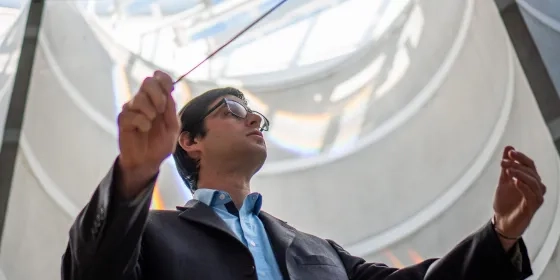John Masko ‘18 Founds National Virtual Medical Orchestra
Doctors, nurses, and medical professionals nationwide perform classical music and heal along the way
John Masko ‘18 is doing his part to help people on the front lines of the pandemic. The conductor and SFCM alum founded the National Virtual Medical Orchestra (NVMO) in late-spring. The group is comprised of doctors, nurses, residents, and other medical professionals nationwide who come together virtually to make classical music. The NVMO recently released their second collaboration—a performance of Brahms Academic Festival Overture.
Masko is no stranger to medical orchestras.
“The first-ever orchestra I got to conduct regularly was the Yale Medical Symphony when I was in college,” recalls Masko. “It’s always been a community that I’ve been close to.”
After receiving his masters in conducting from SFCM, Masko moved back to the east coast and founded the Providence Medical Orchestra. His is one of about 20 similar orchestras around the country—a number that is growing as more musicians in the medical field find healing in music.
The latter is something that drew Masko to work with medical orchestras.
“As musicians, we often have crises of meaning where we wonder if what we’re doing is actually making a difference in the world,” discusses Masko. “What grabbed me about conducting a medical orchestra was the fact that at every rehearsal it was obvious that this was making an impact—every rehearsal felt like a balm to the people participating in it.”
He continues, “Medicine is one of those fields that can consume your entire being. It’s therapeutic for a lot of these medical professionals to say, ‘Okay, on Thursday at 7:30 p.m., I’m going to do something entirely different that also feeds my soul.”
Never has that that been more important than during the pandemic.
When things shut down in March, Masko and his orchestra were unable to meet. Many of his musicians—who were on the front lines battling the coronavirus—reached out hoping to find a way for a creative outlet, something to provide healing and peace.
After seeing virtual grid performances made by professional orchestras, Masko decided to found the NVMO. He partnered with Richard Logothetis (an arts administrator and NVMO’s Executive Director), Christopher Bill (producer/video editor and professional trombonist), and Jason Staniulis (audio editing/mixing) to create each video.
He reached out to the music directors of other medical orchestras around the country and asked them to nominate players to perform in the NVMO (the final video features musicians from 15 different medical orchestras). Players recorded themselves along to a track at home and shared their videos with Masko for review. He’d offer them notes and they’d send the recording back and forth until they were both satisfied with the result. Then, individual videos went to production, where Bill and Staniulis stitched together and mixed all the musicians’ individual parts.
Their first recording of Beethoven Symphony No. 4 Mvt. 2 Adagio, released in June, was well received garnering over 25K views between Facebook and YouTube. Masko, who serves as the orchestra’s music director, chose the piece for both practical and soulful reasons.
“Even a slice of [Beethoven’s Symphony No. 4] showcases a large swath of the orchestra in a short amount of time,” says Masko. “As far as tone, it has a very hopeful and redemptive atmosphere to it, and while being a slow movement, it’s perfect for the medical field because it has this heartbeat sounding motif. Your average listener may not make the connection, but something about it sounded right [because of that motif].”
The NVMO’s second video—Brahms Academic Festival Overture—is another piece that features a large orchestra; it is also arguably the composer’s most boisterous piece. Masko hopes to create more videos with the NVMO featuring a variety of classical music pieces that continue to make a difference in the lives of medical professionals and provide another source of enjoyment for viewers during this time.
See how other SFCM students and alumni are making an impact.
